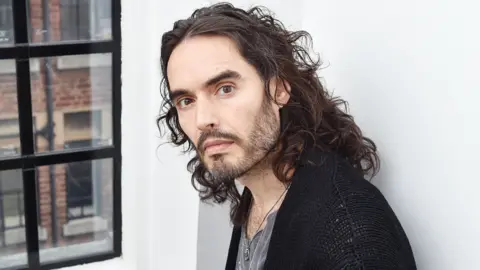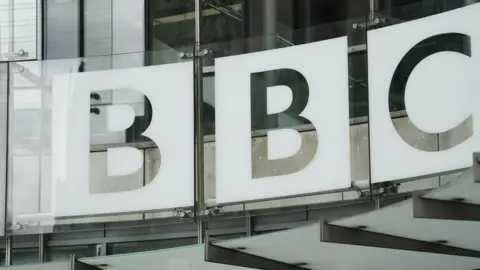Russell Brand: BBC should have thoroughly investigated in 2019, says Bectu
 BBC
BBCThe BBC should have "thoroughly investigated" after managers were told Russell Brand had exposed himself to a woman in a BBC office in 2008, broadcast union Bectu has said.
BBC News management were told in 2019 by a staff member about Brand's alleged behaviour in the BBC News Los Angeles office. No formal action was taken.
Brand was recording his Radio 2 show, in which he laughed about the incident.
The BBC said it would investigate the allegations.
Brand has not yet commented on them.
The head of the union, Philippa Childs, said that had action been taken at the time, "we might not be in the situation we're in now".
She told Radio 4's Today programme that the episode of The Russell Brand Show recorded that day where he was heard laughing about exposing himself was shocking, and should never have been broadcast.
Earlier this week Bectu wrote to broadcasters, including the BBC, urging them to take "a much more proactive, leading role in ensuring the sector is a safe, mentally healthy and respectful place to work for everyone".
Ms Childs said the union wanted the BBC to review its processes "to see whether or not they are fit for purpose and to see whether or not they properly support complainants and deal with issues in real time".
The woman involved, who we are calling Olivia, never made a formal complaint.
She said she had hoped that someone from the BBC would contact her after hearing the recording, which was made days before the episode aired. That never happened.
"I thought to myself, Oh, that's a bit strange, nobody has come to say sorry to me, for his behaviour. So I thought perhaps that particular audio - because it was so graphic - had been cut out, which is probably why I never pursued it."
After hearing a recording of the episode, which aired on 21 June 2008, she said she felt let down by the BBC.
Four women have accused Brand of sexual assaults and rape between 2006 and 2013. Brand has denied the claims, saying his relationships were "always consensual".
On Monday, police said they had received a report of an alleged sexual assault in central London in 2003.
The BBC's director general Tim Davie, who became director of audio and music at the BBC a few days after the show was broadcast, has already announced a review of Russell Brand's time at the BBC, where he worked as a radio presenter between 2006 and 2008.
 PA Media
PA MediaIn a statement, the BBC said it would talk to BBC News staff in Los Angeles and anyone who was working there in 2008, adding they would also like to hear from anyone who might have information.
"Further, the director general has been very clear that some broadcasts from that period were, and are, inexcusable and totally unacceptable, and would never be aired today," it added.
Brand's co-presenter on the show, Matt Morgan, told the BBC he was "not aware until now of the nature of this encounter".
In a statement from his lawyer, he said he condemned all forms of mistreatment of women.
"Looking back on the time I spent working on radio at the BBC, I am regretful to learn that a show I was part of made colleagues uncomfortable at times," he added.
Olivia, who worked in the same building as BBC News, said that she texted a BBC News employee after Brand exposed himself to her in a bathroom.
He told her that he knew what had happened because Brand was talking about it in the studio.
Olivia tracked down a recording of the programme after the Times and Channel 4 published their investigation into Brand's behaviour.
The Radio 2 recording is the first time that Brand has been accused of sexual misconduct and then heard discussing it, raising serious questions about how that part of the show, which was pre-recorded, was allowed to be broadcast days later.
In 2009, Ofcom fined the BBC £150,000 over a Russell Brand and Jonathan Ross phone prank, in what became known as Sachsgate.
Brand and Ross left lewd messages on Fawlty Towers actor Andrew Sachs' answerphone in 2008, while on air on BBC Radio 2 on 18 and 25 October 2008.
Brand subsequently resigned from the BBC in October 2008, as did Radio 2 controller Lesley Douglas and head of compliance Dave Barber.
The BBC says its oversight and compliance procedures were overhauled in 2010 and are now "markedly different".
If you have been affected by any of the issues raised in this story, you can visit the BBC Action Line.
